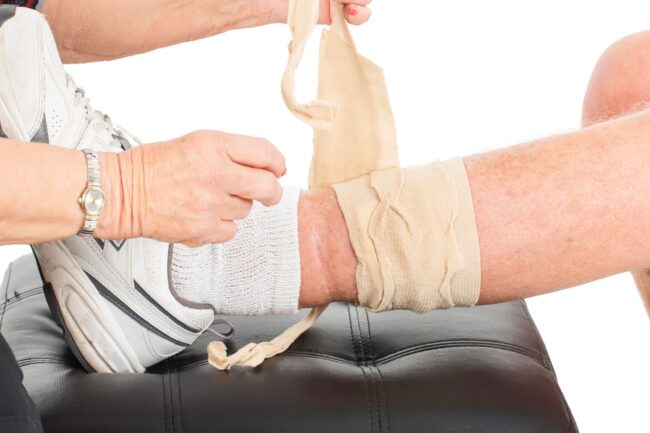Varicose veins can cause many complications. Because of their weakened vein walls and high volume of blood, they’re unfortunately easy to damage especially if you have fragile skin. And once damaged, the bleeding can be unexpectedly severe. So, if you have the condition or know someone who does, here’s what to do about a bleeding varicose vein.
Determine if it’s a varicose vein that’s bleeding
A ruptured, burst or slightly cut varicose vein will bleed differently from an artery or capillary. First, venous blood is deoxygenated, so it will be dark red. Additionally, varicose veins are part of the venous system, which has less pressure behind it than the arterial system. Veins rely on your muscles to move blood back to the heart, so the blood will ‘pour’ rather than ‘squirt’ out as it does with arterial cuts.
But even though there’s less pressure, varicose veins are swollen with blood. Meaning that even a slight cut can make you lose a lot of it very quickly.
Slow the bleeding by applying pressure
Take precautions to slow the bleeding. You can do so by following these steps:
- Remove any clothing that’s around the cut. You may need to cut away a pant leg to avoid disturbing the cut further.
- Apply some medical bandage or gauze if you have a roll on hand. If not, cut thick strips of clean cloth to wrap around the bleeding vein. Pressure is key here, so make sure to wrap the area tight.
- Sit or lay down and elevate the affected area above the heart level.
Call an ambulance
Varicose veins will bleed profusely when cut due to the high volume of blood in them. So if you think it’s a varicose vein that’s bleeding, call an ambulance.
How to tell if a varicose vein is bleeding internally
An internal burst looks like a large bruise as the blood leaks out and spreads under the skin. If the internal bleeding is severe, you might also feel faint and dizzy.
It’s hard to determine the extent of the vein damage if the bleeding is internal. And as the bleeding from a burst varicose vein will be severe, we do not recommend trying to fix it yourself. Instead, elevate the affected area while you’re waiting for the ambulance to arrive.
Can you prevent a varicose vein from bleeding or bursting?
As we mentioned, varicose veins are weak and overflowing with blood. Even a tiny knick or a bit too much pressure from falling, bumping into the corner of a table, or even just scratching or rubbing the area too hard can penetrate the vein wall. So if you have varicose veins, it will be hard to not accidentally rupture them.
The only way to prevent varicose vein bleeding is by treating the varicose vein. Fortunately, modern medical technology has made treatment extremely safe and effective. Procedures like Endovenous Laser Ablation, Radiofrequency Ablation, and VenaSeal are all minimally invasive, meaning you can walk in and walk out with little to no downtime.
Seek specialist advice
At The Vein Institute. we specialise in treating varicose veins in the legs. If you’re ready to start your treatment journey or have any questions you’d like to ask about our process, give us a call at 13 VEINS (that’s 13 83467) or request a callback.

